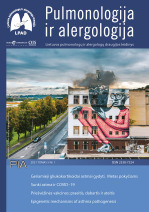EPIGENETIC MECHANISM OF ASTHMA PATHOGENESIS
Abstract
Asthma is a heterogeneous chronic lung disease linked with increased inflammation and reversible obstruction of the airways. The immunoregulatory pathways underlying asthma include many different cell types, and eosinophils are major effector cells in disease pathogenesis. Their development is regulated and dependent on epigenetic factors that are still incompletely understood. Because epigenetic mechanisms are related to the effects of the environment, such as air pollution and tobacco smoke, their contribution to asthma pathogenesis is under active investigation. Asthma does not follow Mendelian patterns of inheritance; consequently, mechanisms are more complex, and the genes responsible for disease inheriting remain unidentified. Asthma epigenetics covers the transient and heritable phenotypic changes in gene expression without directly changing the DNA sequence. Three epigenetic mechanisms are distinguished, including DNA methylation, histone modifications, and the expression of non-coding RNAs. DNA methylation sites are notably altered in the airway epithelium, in turn contributing to immune responses and eosinophil activation. Histone modifications suggest themselves as regulators for the relief of asthma symptoms. Non-coding RNA-based therapies show a promising diagnostic potential to indicate severity, heterogeneity, and phenotype of asthma. Identification of altered methylation sites, significant changes in histone status, and non-coding RNA signatures in asthma patients can provide potential biomarkers of new therapeutic options for the treatment. For this reason, asthma epigenetics has recently attracted substantial interest. In this scientific review, the main focus will be on the current understanding of connections between epigenetic mechanisms and asthma pathogenesis.


